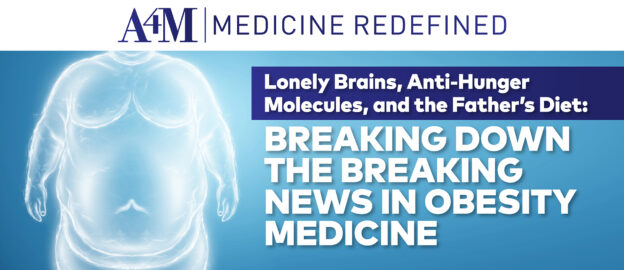As the U.S. obesity prevalence surpasses 40% in the adult population, the need for effective, long-term weight management solutions has become a national health imperative. In the quest for reliable weight loss interventions, scientists are working tirelessly to address this metabolic health crisis. Amid this challenge, a new star has risen in the form of semaglutide and similar GLP-1 agonists. While Ozempic and its counterparts have shown remarkable results in aiding weight loss, captured headlines, and ignited hopes, they are just one facet of the rapidly evolving landscape of obesity medicine innovation.
Behind the scenes, emerging research is shedding light on the complex interplay between the body, brain, biological systems, and dietary patterns. Recent scientific discoveries, such as the surprising impact of loneliness on eating habits and the intriguing influence of a father’s diet on offspring health, underscore the importance of an integrated and multifaceted approach to weight management. This growing body of research is challenging long-held beliefs and opening up new avenues for prevention and treatment, laying the foundation for a more informed and promising future in weight management.
The Latest Headlines in Obesity Medicine and Research
The studies below showcase some of the most recent, impactful, and fascinating findings in obesity medicine and research.
Feeding The Lonely Brain: Female Eating Habits
A study conducted by the University of California, Los Angeles Health Sciences department has revealed a striking connection between loneliness and unhealthy eating behaviors in women. The research found that women who perceived themselves as lonely exhibited increased brain activity in regions associated with food cravings, particularly for high-calorie, sugary foods. This finding highlights the negative impact of social isolation on overall well-being and metabolic health. It also reveals the potential for a vicious cycle between unhealthy eating habits and negative mental health symptoms, as increased cravings may lead to excessive eating and, in turn, more anxiety and depression symptoms. The team’s future research initiatives will dive deeper, aiming to explore other biological markers, such as metabolites, microbiome health, and inflammatory signatures, associated with loneliness.
Key Insights:
• Loneliness in women was linked to heightened brain activity related to cravings and motivation for eating, especially when exposed to pictures of high-calorie foods like sugary items.
• Socially isolated women exhibited higher fat mass, poorer diet quality, increased cravings, reward-based eating, uncontrolled eating, and elevated levels of anxiety and depression.
• Lonely individuals reported underestimating their food intake and had stronger desires and cravings, particularly for unhealthy foods.
Multi-Organ Response to Fasting: Results Visible by Day 3
A study conducted by researchers at the Queen Mary University of London has revealed that the body undergoes significant changes across various organs during prolonged periods of fasting, denoting numerous health benefits beyond weight loss and potential health-altering effects after three days of total caloric restriction. The research, published in Nature Metabolism, sheds light on the molecular adaptations and systemic responses to fasting, providing insight into developing therapeutic interventions for individuals who may benefit from fasting but cannot undergo prolonged fasting or fasting-mimicking diets.
Key Insights:
• Humans have historically harnessed the ability to survive without food for prolonged periods for various purposes, including medical, cultural, and weight loss reasons, recognizing the potential health benefits of fasting.
• Prolonged fasting triggers a cascade of systemic changes throughout the body, affecting multiple organs and offering health benefits beyond weight loss.
• The critical window for health-altering changes induced by fasting appears to be after three days of complete food deprivation. During their seven-day water-only fast, study participants exhibited significant changes in protein levels after the third day, signifying a comprehensive whole-body response to calorie restriction.
• During fasting, the body undergoes a metabolic shift, transitioning from glucose as its primary energy source to the utilization of fat stores. This adaptation leads to weight loss and notable changes in protein levels across major organs, highlighting the profound impact of fasting on the body’s metabolic processes.
The Father’s Diet: Generational Metabolic and Mental Impact
New research from the University of Sydney suggests that a father’s diet can influence the anxiety levels in sons and metabolic health in daughters even before conception. The study, conducted on mice, found that the type and composition, including macronutrient balance, of the father’s diet plays a significant role in shaping the health and behavior of offspring beyond just the quantity of calories consumed.
Key Insights:
• Male mice fed low protein and high carbohydrate diets were more likely to have sons with higher levels of anxiety, while those on high-fat diets were more likely to have daughters with markers of metabolic disease.
• The study’s findings, published in Nature Communications, highlight how influential the father’s diet can be in programming specific characteristics in the next generation.
• This discovery paves the way for potential dietary guidelines for fathers-to-be, aiming to reduce the risk of metabolic disease and mood disorders in future generations.
The “Anti-Hunger” Molecule: Exercise Mimetic Properties of Metformin
A study conducted by researchers at Stanford Medicine and Harvard Medical School discovered that the diabetes drug metformin induces the production of lac-phe, a molecule associated with post-exercise weight loss often referred to as the “anti-hunger” molecule. The study found that metformin’s weight loss effects are linked to the same pathway as vigorous exercise-induced appetite reduction. Understanding these mechanisms through such discoveries brings to light the potential of metformin as an exercise mimetic, offering new hope for individuals struggling with obesity and related metabolic disorders.
Key Insights:
• Metformin, a well-established diabetes medication, has been found to induce the production of lac-phe, a molecule linked to the weight loss effects of vigorous exercise.
• Lac-phe, first identified by Stanford Medicine researchers in 2022, is now understood to play a crucial role in regulating metabolism, exercise response, and appetite.
• Metformin administration leads to elevated levels of lac-phe in both animal models and human subjects, resulting in significant appetite suppression and weight loss.
• The study suggests that metformin and vigorous exercise share overlapping pathways in their effects on hunger reduction and weight loss, opening up new possibilities for developing targeted therapies that mimic the benefits of exercise without the need for intense physical activity.
• Interestingly, the involvement of intestinal epithelial cells in the production of lac-phe suggests a potential gut-brain communication pathway that warrants further investigation.
Caloric Restriction and Aging: The Telomere Connection
A recent study led by Penn State researchers, in collaboration with various universities and supported by the National Institute on Aging, has unveiled new information on the elaborate relationship between caloric restriction, telomere length, and the aging process. Caloric restriction has been shown to impact telomere length, a cellular aging biomarker. Previous studies have suggested that caloric restriction may extend lifespan by reducing oxidative stress in cells, a factor known to contribute to telomere attrition and cellular senescence.
By analyzing data from the CALERIE study, the researchers discovered that individuals undergoing caloric restriction initially experienced a more rapid loss of telomeres. However, this loss slowed down once their weight stabilized. Although both the calorie-restricted and control groups had similar telomere lengths at the end of the two-year study, these findings provide valuable insights into the impact of caloric-restriction diets on biological aging.
Key Insights:
• The results of the Penn State study revealed a fascinating pattern: individuals on caloric restriction initially experienced a more rapid loss of telomeres compared to the control group. However, once their weight stabilized, the rate of telomere loss slowed down.
• The calorie-restricted and control groups had similar telomere lengths at the end of the two-year study.
• While the two-year study did not demonstrate the clear benefits of caloric restriction on telomere length, it provides promising insights into the potential health benefits of caloric restriction in humans.
• The findings underscore the need for longer-term studies to fully understand the impact of caloric restriction on biological aging and overall health span.
The latest research in obesity medicine and weight management continues to provide valuable insights and deepen the scientific community’s understanding of body weight and the numerous factors contributing to metabolic regulation. From the impact of loneliness on eating habits to the potential benefits of fasting and caloric restriction, these studies highlight the importance of a functional, integrative medicine approach to addressing obesity and its related health concerns.
As clinicians and researchers continue to explore these findings, staying informed about advancements in the field is crucial. By understanding the mechanisms behind these discoveries, clinicians can develop more effective strategies to promote healthy eating habits, reduce the risk of metabolic disorders, and improve overall well-being. As the landscape of obesity medicine continues to evolve, it is essential for healthcare professionals to have access to the most up-to-date information and tools to provide the best possible care for their patients.
As this exciting new era in weight management unfolds, groundbreaking, evidence-based tools and interventions are likely to emerge that could transform the lives of millions struggling with obesity across the globe.
Do you want to be part of the solution?
We invite you to join us in Scottsdale, Arizona, from May 9-10 for the inaugural rendition of our best-in-class Clinical Weight Management Certification Program!

Next week, integrative health experts, clinical nutritionists, and leaders in metabolic and obesity medicine will gather for a groundbreaking program designed to equip practitioners with a comprehensive understanding of integrative weight management strategies, evidence-based protocols, best practices, and more. Don’t miss this opportunity to enhance your expertise, network with like-minded professionals, and become part of the solution to one of the most pressing health challenges of our time. Click here to learn more.

